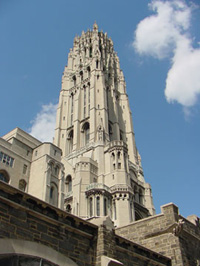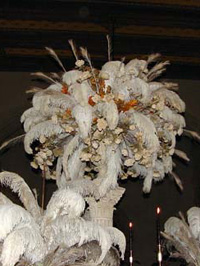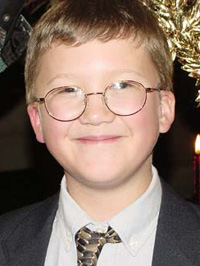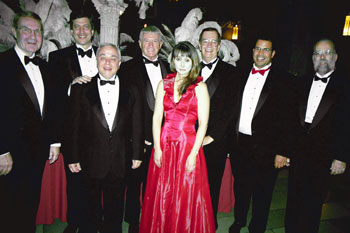 |
|
| The Riverside Church |

 |
|
The Centerpiece of the
Gala Reception |

 |
|
Reception Photographer
Corey Baker |
|
|
One of the speakers at the recent memorial concert commemorating the twentieth anniversary of the death of Virgil Fox referred to the eerily and gorgeously back-lighted, stained-glass, rose-like windows of Manhattan’s Riverside Church as metaphors for Fox’s luminous career.
“The color is in the glass,” he said, referring to the colors of the music drawn from the exquisite palette of J.S. Bach.
Virgil was the sun behind the glass, he went on, who could illuminate the glorious coloration of Bach’s music.
I was moved by the speaker’s words, and by the images they conjured, admiring them for perfectly capturing the communal spirit of this extraordinary event. The following day I was amazed to learn that the speaker had paraphrased words that I, myself, had written decades ago about the classical light show called “Heavy Organ” (which I named) when I used to write most of Virgil’s publicity materials.
“Whom shall we admire more?” I had asked. “Bach, or Bach’s interpreters? The Rose, or the lights behind it?”
Eight musicians played appropriate selections from repertoire familiar to any Fox admirer. They were: classical and theatre organist, Tom Hazleton; noted organ and choral composer, Robert Hebble; Organist of the Riverside Church, Timothy E. Smith; former student of Virgil’s, Steven Frank; Assistant Organist of the Riverside Church, Mark Miller; electronic organ aficionado, Robert Tall; British organist, Carol Williams; and successor Organist to Virgil Fox at the Riverside Church, Frederick Swann. These outstanding artists played selections from Bach, Purvis, Hebble, Bingham, Jongen, Miller, Davies, Tournemire, Joplin, and Karg-Elert.
The performances were never less than engaging, appropriate, and satisfying. Two things worth special mention were Steven Frank’s virtuoso display of the “Toccata from Symphonie-Concertante” of Joseph Jongen; and the world-class compositional talent displayed in Mark Miller’s “Toccata on God Rest Ye Merry.” Both artists should work harder (as Virgil so notably did) to take their talents beyond the inbred confines of the organ world, into the larger musical world, where they will be better appreciated.
J. Michael Barone was the perfect choice to host the event, and Richard Torrence injected a few welcome moments of levity reading from the manuscript of another organist who should have been there, namely, the late Ted Alan Worth, who was one of Virgil’s most important virtuoso proteges.
But the greatest accolades and appreciation should go to the organizers of the event, especially Len and Lance Levasseur, Steven Frank, and F. Anthony Thurman of the AGO. These guys dreamt it up and staged it splendidly, displaying great amounts of love, not just for Virgil, but for the entire community who gathered in his name to celebrate the life and art of the greatest organist of the Twentieth Century.
By the end of concert, in darkness, with Fred Swann playing “Come, Sweet Death” on Virgil’s magnificent instrument, and with a tower bell ringing out the twenty years since Virgil’s passing, the stunned audience of more than 1,000 seemed to be unified in a manner that was extremely rare and uniquely American. As Virgil would definitely have put it (and I knew him well!), “There wasn’t a dry seat in the house!”
— Marshall Yaeger
|

